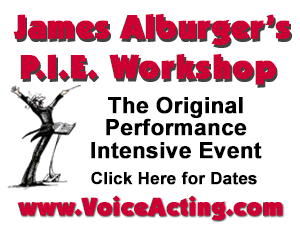|
What To Do When Good Clients
Create 'Uncomfortable Situations'
By David Goldberg
Coach and Producer
Edge Studio
 You no doubt have many good clients. But even they can create what we'll call "uncomfortable situations." You no doubt have many good clients. But even they can create what we'll call "uncomfortable situations." What to do when this happens?
Here is advice for dealing with and preventing such situations from occurring, while keeping your clients happy.
SITUATION:
BUT THAT'S NOT WHAT YOU TOLD ME!
Your perspective: Your client tells you that your recording will be used for local radio, but months later you hear it playing on regional television.
Client's perspective: Why should they have to pay more? Regardless of where the commercial plays it was the same amount of work on your part.
Action: Let your client know that it is standard industry practice to receive larger compensation for recordings with greater coverage.
If that doesn't work, try telling them that you had originally given them a discount since their job was small.
Then win some points: tell them you're glad to extend the "small job" price to them for the larger job since they didn't know.
Tip: Always openly discuss the "usage" of your recordings with your client BEFORE you provide them with an estimate. In fact, there are three types of usage to be clear about:
SITUATION:
WHAT'S THAT WORD COUNT?
Your perspective: You and your client agree to a price, based on word count. But at the recording, they present you with a script containing many more words than your estimate was based on.
Client's perspective: Your client didn't even know the script was longer. It was the script writer who added more words, and they didn't know that you would be paid "by the word" to record it.
Action: Before you record, tell your client that the script seems longer than expected, and since your agreement was based on word count, ask if they are okay if you go over the estimate price.
Be prepared to tell them by how much. But use your judgment. If the script has only a few more words than you estimated for, it probably is best NOT to say anything.
Tip: When your estimate is based on word count (which is not always the case), always be clear about "per word" costs, rather than simply providing a total cost.
SITUATION:
OH, WAS THERE MORE?
Your perspective: You and your client agree to a price to record a commercial. At the studio, however, they present five tags for you to record along with the commercial.
Client's perspective: The tags are part of the commercial, so they don't understand why you'd charge extra to record them.
Action: Explain that it is standard industry practice to be paid extra for tags - especially since the recording of each tag allows your client to re-use the commercial without needing you to re-record it.
Tip: When providing an estimate for a job that could have extra "parts" - such as tags - ask if they'll be needed and, if so, include a line item in your estimate about them.
If your client says that they will not be needed, state in your estimate that the cost is for the script only, and not for tags. Doing so is the sign of an experienced voice talent.
SITUATION:
TOO LATE
Your perspective: After trying to impress your client by completing the recording ahead of schedule, your client sends you a revised version of the script.
Client's perspective: You went ahead and recorded before they told you to do so, so they have every right to request that you re-record.
Action: Explain that you made an error. Ask what changes there are and if possible, simply record the changes and insert them into the previous recording.
Of course, you need to "match" the new recording with the old recording so that they blend together. If you cannot match the recordings, re-record the full script again - and consider the first recording to have been practice.
Tip: Always have the client write, "This is the final script we want you to record" when they email it to you.
Doing so prevents you from inadvertently recording the wrong version.
SITUATION:
WHAT'S THAT? YOU'VE GOT MORE?
Your perspective: After completing a recording, your client presents you with pickups (additions and/or revised passages) and expects you to record them at no extra cost.
Client's perspective: They assume you were paid to record the project, even if it came in two pieces.
Action: Explain that re-recording takes a LOT of time, since you need to open your original recording and "match" your new recording level and vocal delivery to it so that it blends with the original recording.
Tip: Always discuss (or account for) pickup and revision costs with your client before creating your estimate.
SITUATION:
RAW? EDITED?
Your perspective: You provide your client with raw files, but then they say they need edited files, and they don't want to pay more.
Client's perspective: Why would they ever want raw files? Obviously, they don't have the software to edit the audio. They went to you because you're the pro. Obviously, they wanted edited files.
Action: Explain the difference between raw and edited files, and tell them you're glad to edit the files. But also explain that the cost of editing was not included in the rate you had given them and it will cost extra.
Or, tell them that the cost of editing was deducted from the rate you had given them.
Then win some points: Say you're glad to provide editing at no extra cost since they didn't know.
Tip: Always be super-clear with your client before providing the estimate as to what exactly they want from you.
Clients do NOT know the difference between raw and edited files. Discuss this with your client.
SITUATION:
ENOUGH ALREADY
Your perspective: You were brought into the studio to record just a few minutes worth of script. But you waited for hours in their waiting room before they were ready to record. And they don't want to pay you for that time.
Client's perspective: You are paid by the recording, not the time.
Action: After waiting 20 minutes, politely ask how much longer they expect the wait to be. This shows that your time is valuable, but that you're easy-going.
If they reply that you have a while yet to wait, ask if they prefer to re-schedule, or if there is a quiet place for you to work.
BUT DO NOT discuss extra pay for waiting. Either you had previously discussed extra pay for waiting, in which case, there is no reason to mention it (in fact, be happy about it since you're getting paid by the hour), or you had NOT discussed extra pay for waiting with your client, in which case you have little right to ask for it now.
Tip: In addition to your total fee, always include a "time allotment" in your estimate and explain that anything over that time will cost extra.
But be careful: you do not want your client to think that you'll try to eat up time to increase your final fee.
SITUATION:
SQUEEZED OUT
Your perspective: Your client contacts you directly to schedule a recording, even though they SHOULD go through the middle man (your casting agent, representative...) that acted as the middle man last time the client used your services.
Client's perspective: They should be able to contact you directly. After all, you are the one recording.
Action: Show your scruples. Explain the casting process to your client and let them see that you're honest. This is also a TERRIFIC opportunity to impress your casting agent by showing them that you want to include them in the picture.
Tip: If you work through an agent, always give their contact information to your client, not yours.
Exception: if you have an agent for commercial work but not for narration work, include yours' and your agent's information on your business card and clearly indicate when to call which one.
YOU'RE THE EXPERT
Please remember that your client does NOT know the inner-workings of our voice-over world - just as we don't know their business.
So rather than put clients on the defensive, openly and politely discuss situations with them.
Explain that you want to build a strong relationship.
HAPPENS ALL THE TIME
Still, misunderstandings happen all the time. Here are "wonderful" quotes I've heard clients say to voice talent:
And my favorite:
"Thanks for a terrific job. We always bring our work to you, except when we do it in-house to save money. But then we usually end up having you fix it anyway."
ABOUT DAVID ...
David Goldberg is a voice-over producer, coach, and the owner of Edge Studio, a major voice-over recording studio and voice-over education company based in New York City, with additional studios in Fairfield, CT and Bethesda, MD. Edge Studio offers a large variety of in-person and telecourse workshops. It also produces audio for major clients including Disney, VW, Microsoft, National Geographic, and frequently casts voice talent who have trained and produced demos there.
Email: edge@edgestudio.com Web: www.edgestudio.com/careerbuilding.htm
|
|
|
Tell Us What YOU Think!
Please Note: Since we check for spam, there will be a slight delay in the actual posting of your comment.
Comments (1)
Alexx Daye
8/5/2011 at 6:47 PM
This is PRICELESS information. Thanks a trillion!!!!! I've been on the music recording side of the industry for twenty five years. This information is greatly appreciated!!










click for new article alerts